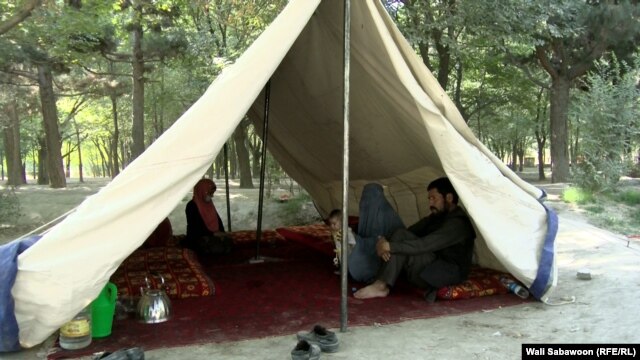Family of Afghan teenage girl who burned to death demand justice
| Publisher | Radio Free Europe/Radio Liberty |
| Publication Date | 20 July 2016 |
| Cite as | Radio Free Europe/Radio Liberty, Family of Afghan teenage girl who burned to death demand justice, 20 July 2016, available at: https://www.refworld.org/docid/57a43c9b22.html [accessed 19 May 2023] |
| Disclaimer | This is not a UNHCR publication. UNHCR is not responsible for, nor does it necessarily endorse, its content. Any views expressed are solely those of the author or publisher and do not necessarily reflect those of UNHCR, the United Nations or its Member States. |
July 20, 2016
By RFE/RL's Radio Free Afghanistan
 Fourteen-year-old Zahra's parent's set up a protest tent in Kabul demanding justice for their daughter who burned to death earlier this month. Her family say she was set alight by her husband's relatives.
Fourteen-year-old Zahra's parent's set up a protest tent in Kabul demanding justice for their daughter who burned to death earlier this month. Her family say she was set alight by her husband's relatives.
The family of a pregnant Afghan girl who was burned to death has demanded that the government bring the alleged perpetrators to justice.
The family of 14-year-old Zahra says she was tortured and set alight by her husband's family in the central province of Ghor. Relatives of the teenager's husband insist her death was by self-immolation.
Zahra's parents have set up a protest tent in Kabul demanding justice for their daughter, who was brought to Kabul with burns covering 90 percent of her body. She died in a hospital six days later, on July 16.
"We will not leave this tent until justice has been done," Zahra's father, Mohammad Azam, told RFE/RL's Radio Free Afghanistan on July 20.
Azam said he had complained to the provincial council and the provincial judiciary that his daughter was mistreated in her husband's house but that no one listened.
Azam said the girl, who was four months' pregnant, had been married when she was 12.
According to Ghor's police chief, Zahra's father-in-law and mother-in-law were in custody and being questioned. No charges have been brought against the two, and Zahra's husband remains at large.
Violence against women, including domestic violence, is commonplace in Afghanistan, where perpetrators often go unpunished.
Some Afghan women have turned to self-immolation to escape domestic violence.
Zahra's death last week has prompted outrage across Afghanistan, with rights groups demanding that the Afghan government bring an end to child marriages.
Child marriages are common in Afghanistan, though the legal age for marriage is 16 for girls.
"The story of Zahra is an extreme example of what can happen when a child is forcibly made to marry, but we know that this is not an isolated case and that this practice is all too common in many parts of the country," the nongovernmental organization Save The Children said in a July 20 statement.
"Early marriages are a material breach of the fundamental rights of a child. Zahra and many other girls who are given in marriage at a young age are deprived of their right to education, to security, and the ability to choose their future," the group added.
With reporting by AFP and dpa
Link to original story on RFE/RL website
